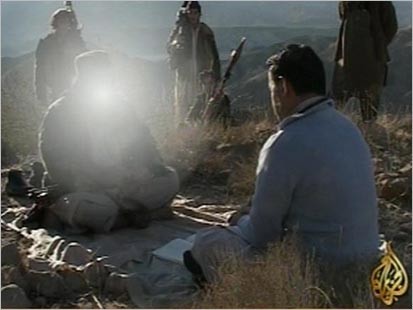Baitullah Mehsud: The Most Powerful Man in Waziristan
BY Herschel SmithThree days ago in my article Taliban Campaigns in Afghanistan and Pakistan, I cited an Asia Times article in which it was reported that Baitullah Mehsud was sacked by Taliban leader Mullah Omar.
With the Taliban’s spring offensive just months away, the Afghan front has been quiet as Taliban and al-Qaeda militants have been heavily engaged in fighting security forces in Pakistan’s tribal regions.
But now Taliban leader Mullah Omar has put his foot down and reset the goals for the Taliban: their primary task is the struggle in Afghanistan, not against the Pakistan state.
Mullah Omar has sacked his own appointed leader of the Pakistani Taliban, Baitullah Mehsud, the main architect of the fight against Pakistani security forces, and urged all Taliban commanders to turn their venom against North Atlantic Treaty Organization (NATO) forces, highly placed contacts in the Taliban told Asia Times Online. Mullah Omar then appointed Moulvi Faqir Mohammed (a commander from Bajaur Agency) but he refused the job. In the past few days, the Pakistani Taliban have held several meetings but have not yet appointed a replacement to Mehsud.
Only now is the Hindustan Times and the Tehran Times catching up and reporting on this important development. However, I also discussed Mehsud’s power in Pakistan and suggested that he would retain control of some of his troops, with Mullah Omar retaining control of his fighters and re-entering the campaign in Afghanistan with heavy insurgency. The Taliban will become factious, but it will not disintegrate.

Baitullah Mehsud, the chosen leader of a militant coalition known as the “Taliban Movement of Pakistan,” a collection of 26 groups that have come together to battle the Pakistani army, sits down with al Jazeera’s bureau chief in Islamabad from an undisclosed location in northwest Pakistan. (Al Jazeera)
Some analysts believe that Baitullah Mehsud is more powerful than Osama bin Laden; he is said to be the single most important man in Pakistan’s future. For the time being, he has certainly become the most powerful man in Waziristan.
He has kept his face hidden from journalists, meaning that few outsiders even know what he looks like, although locals report that he receives treatment for diabetes. “Despite the fact that he is a diabetic, he is a very active man,” says Hussein Barki, a local tribal chief. “He changes his hide-outs so frequently, leaving the intelligence agencies clueless about him.”
Mehsud began his rise a decade ago, when he headed off to Afghanistan to fight with the Taliban. He comes from the Mehsud tribe, the largest in South Waziristan, but he, like most of his jihadist counterparts, did not have any stature in traditional tribal leadership. “They came up outside the tribal structure through the meritocracy of jihad,” says Fair. “They raised money harboring al Qaeda and other elements” in Pakistan’s tribal regions …
Mehsud has become deeply entrenched in Waziristan. The immediate source of his power is a corps of several hundred foreign fighters, mostly Uzbeks and other Central Asians, whom he commands. Along with his tribal followers, Mehsud is estimated to command several thousand armed militiamen, although he has claimed higher numbers.
Either way, Mehsud has established himself as someone locals respect, as well as fear. “He is no doubt the most influential and powerful person of South and North Waziristan,” says Barki, the tribal chief. “He has restored law and order in the area. But people also believe that there are many bad people in his militia.”
Pakistani forces have tried to strike back at Mehsud and his followers, but the most visible results have been significant casualties on the government side. With the powerful traditions of tribal loyalty, Mehsud also appears to have benefited from the local reaction to the government’s assault on him. “Those who are not supporters of Osama [bin Laden] or Baitullah, even they have been forced by the indiscriminate military operations to harbor sympathies for them,” says Momin Khan, the owner of a small trucking company in South Waziristan.
Still, Mehsud is a “ferocious enforcer” of his harsh interpretation of Islamic law, according to one U.S. intelligence official, and his zealotry has begun to alienate many locals. “He has enforced his own rules in the area binding men not to shave their beards,” says Naseeb Khan, who runs a small public telephone office in Wana, the capital of South Waziristan. “Playing music and watching videos are against the law here.”
Still, Khan adds that if he needs to settle any kind of legal issue, he will go to Mehsud and not the local courts. Says Khan, “He is the law here.”
Our analysis: This power and ‘moral authority’ will prevent Mullah Omar’s attempt to sack him and regain control of the Pakistan Taliban from succeeding. This data still points to multiple Taliban fronts in 2008: one in Afghanistan, and the other in Pakistan. As we have pointed out before (and as pointed out by Lt. Gen. Douglas Lute), the fates of Afghanistan and Pakistan are inextricably linked. An increase in force size for Afghanistan of only 3200 Marines is a small commitment given the stakes.





No comments yet.
RSS feed for comments on this post. TrackBack URL
Leave a comment